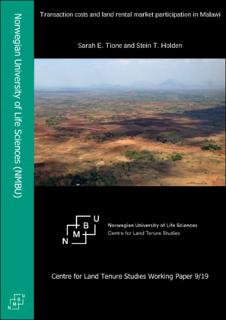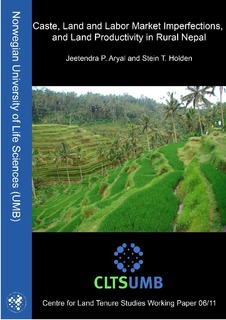Transaction costs of farmers’ participation in forest management: policy implications of payments for environmental services schemes in Vietnam
Recent research on payments for environmental services (PES) has observed that high transaction costs (TCs) are incurred through the implementation of PES schemes and farmer participation. TCs incurred by households are considered to be an obstacle to the participation in and efficiency of PES policies. This study aims to understand transactions related to previous forest plantation programmes and to estimate the actual TCs incurred by farmers who participated in these programmes in a mountainous area of northwestern Vietnam.
Inclusiveness of contract farming along the vertical coordination continuum: Evidence from the Vietnamese rice sector
The Vietnamese government is currently attempting to upgrade rice value chains in the Mekong River Delta by encouraging (i) vertical coordination between exporters and farmers through contract farming, and (ii) horizontal coordination among farmers through the “small farmers, large field” program. Previous studies on the determinants of contract farming participation assume that firms offer only a single contract type, whereas in reality, farmers may face a continuum of exclusive contract options.
Critical factors for crop-livestock integration beyond the farm level: A cross-analysis of worldwide case studies
Despite their recognized agricultural sustainability benefits, mixed crop-livestock farms have declined in the Northern hemisphere. As such, crop-livestock integration beyond the farm level is a promising alternative to this trend, but the knowledge of critical factors and strategies towards its successful implementation is still lacking. We developed an analytical framework to assess the critical determinants of the emergence and outcomes of integration, which helped us understand farmers’ collective strategies for reducing integration transaction costs.
LAND MARKET DYNAMICS ON AN EXPANDING FRONTIER: INVESTMENT IN BRAZIL
In the last years the Brazilian agricultural frontier is expanding towards the cerrado region, more specifically the region called MATOPIBA, comprised of savannah areas of four different states located in the north and northeastern parts of the country. This research paper aims to show a recent pattern of second wave investments in the frontier aimed at inferior quality land.
Land Governance and Development in Brazilian Rural Space: A comparison between Livestock and Agricultural production in Mato Grosso do Sul state.
This article presents a comparison for the impact from lack of land governance in Brazil between livestock and agricultural production. It begins with a brief description of the land regulatory system and its development in Mato Grosso do Sul State and Brazil. The methodology was based on focus groups research, conducted by CEPEA/USP (Center for advanced Studies on Applied Economics/University of São Paulo) on local production sites in Mato Grosso do Sul state, where a regional modal farm was established.
Transaction costs and land rental market participation in Malawi
We assess the extent of access and degree of participation by smallholder tenants in the land rental market in Malawi. Our study is based on three rounds of nationally representative Living Standards Measurement Surveys collected in 2010, 2013 and 2016, from which we construct a balanced panel. We apply the transaction cost theory, which suggests transaction costs to be non-linear and depend on resource as well as socioeconomic characteristics within the customary tenure system that determines who hold, use and transfer land.
Caste, land and labour market imperfections, and land productivity in rural Nepal
This paper provides new evidence on the caste-related land productivity differential and its explanations in rural Nepal using household plot panel data. Low-caste households are found to have significantly higher land productivity on their owner-operated plots as compared to high-caste households. A comparison between the rented in land of low-caste and the owneroperated land of high-caste households showed that the former has significantly higher land productivity. No significant Marshallian inefficiency was found in the case of low-caste tenant households.
Are smallholder farmers credit constrained? evidence on demand and supply constraints of credit in Ethiopia and Tanzania
Credit constraint is considered by many as one of the key barriers to adoption of modern agricultural technologies, such as chemical fertilizer, improved seeds, and irrigation technologies, among smallholders. Past research and much policy discourse associates agricultural credit constraints with supply-side factors, such as limited access to credit sources or high costs of borrowing. However, demand-side factors, such as risk-aversion and financial illiteracy among borrowers, as well as high transaction costs, can also play important roles in credit-rationing for smallholders.
A Review of the Participation of Smallholder Farmers in Land-based Carbon Payment Schemes
There is renewed interest in the engagement of smallholder farmers in carbon markets. This follows in the wake of commitments by governments and companies to reduce or avoid the release of greenhouse gases. It is well known that soil can store large amounts of carbon, and soil stewardship offers a means to harness this potential. However, issues around permanence and scaling in smallholder farmer systems must be addressed if progress is to be made in this area.
Strengthening multi-stakeholder agroecology platforms in Peru: A landscape analysis.
Using multi-stakeholder platforms offers a promising approach for sharing agricultural innovation, reducing transaction costs, and catalyzing development through stimulating stakeholder engagement in the innovation process to accelerate food systems transformation. Agriculture-related multi-stakeholder platforms (AMSPs) are major players to intervention strategies of agricultural development programs. However, often AMSPs have faced multiple challenges that limit and negatively impact their functions.
Perceptions of wood-processing industries on FLEGT implementation: Insights from Vietnam
This paper analyses timber and wood processing companies' views on opportunities and challenges for FLEGT implementation in Vietnam based on a literature review, online surveys with 56 timber and wood processing companies, in-depth interviews with 26 stakeholders from different institutions, and a consultation workshop involving 94 participants.







